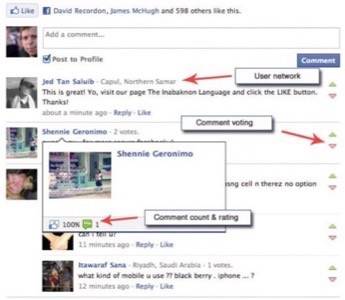This morning, Facebook released its much-feared commenting solution. The idea made big news earlier this year, despite the fact that Facebook has already offered a commenting solution for more than a year, but today the company has announced the feature officially.

So what’s new? There are a number of features for both publishers and users, although some of the most exciting features we’ve seen displayed on Facebook late last year don’t appear to be a part of the release. Is Facebook’s massive social graph enough to push it into the default slot for comments, where it already resides for things like social sharing and third-party login?
According to a Facebook spokesperson, the new commenting system will be a quick install for publishers, with a single line of code. Sharing comments on Facebook will, of course, be seamless. This is probably the biggest impetus to use the system – comments made on the publisher’s site or on Facebook itself will be displayed in both locations. The new commenting feature will also come with moderation controls so administrators can blacklist certain users and language.
On the user end, there’s the obvious benefit of serving as a quickly and easily accessible commenting system. That is, if you want to comment using your Facebook identity. All users commenting will have to be logged in using Facebook, which could present a problem for some who either don’t want to link their real identity with their commenting or who don’t have a Facebook account. Now, more information than ever could be available on third-party sites using the Facebook comment plugin:
You can obtain more context about a person by looking at the text next to their name, which will show if you have a mutual friend, the person’s work title, the person’s age, or the place that a person currently lives. This information will always respect the person’s privacy settings and will only show what you can already see on Facebook.
Beyond that, most features are as expected – comments are threaded, will rise or drop according to the number of likes they receive, users can help mark comments as spam or abusive and share comments back to Facebook. The feature some will be most excited about, we expect, is the ability to comment as a Facebook Page, rather than just a user.
The big question is, where are all the bells and whistles? Remember this?

We got a glimpse of this commenting system on Facebook back in October 2010 and it looked like something to really be excited about. It had comment voting, rating counts, and gave individual stats on each commenter and comment. It looks like some of those features have been pulled into the background, as we’re still seeing user networks in the new system, but no more down-voting. What’s a user got to do to get a dislike around here?
The feature is launching with four initial partners: Discovery.com, Examiner.com, Sporting News and SBNation.
Will this be the feature to put companies like Disqus and Livefyre out of business? Facebook’s 600-plus million strong network is a strong argument as it allows what we imagine to be a simple and easy implementation. The only thing that gives us pause is the continued resistance we’ve seen from users to adopt the idea that they visibly use their Facebook identity – their real, linked name – in other places on the Web. Most other commenting systems offer a variety of options, while Facebook will offer just one – Facebook.
Unless, of course, Peter Kafka was correct, but we haven’t seen that functionality mentioned or in use quite yet. According to TechCrunch, the new commenting system will only allow one other identity: Yahoo. Apparently Facebook is working with other parties, but we have yet to see two big players get in the game yet: Twitter and Google. Can these companies work together on this one? Will Facebook be willing to give up control over the one thing it has sought domination over – your online identity?










